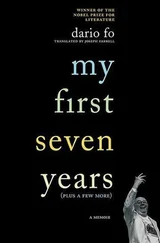The woman in the wrap showed me in and locked the door behind me. She won’t be home till the evening, she said, and pushed past me. I was pretty sure she knew who I was. She walked down a narrow, dark hallway, past a half-open door behind which I could hear voices. It took me a moment to realize that the voices were from a television. At the end of the hallway was a kitchen that was clean and tidy. The window was open, and looked out onto the back of the building, where I could hear children and the noise of a lawn mower in the distance. The woman in the wrap slumped onto a chair with a faint groan, then got up right away and asked me if I wanted something to drink. Just a glass of water, I said, please. She filled two glasses at the tap, pulled a stool from under the table for me, and sat down again with another sigh.
She said her name was Eva. She lived here with Ivona and another friend. Ivona was her cousin. She had gotten her the job at the Christian bookstore where I had first met her. We actually met in a beer garden, I contradicted her, fifteen years ago. She was always stubborn, said Eva, and laughed. I asked her what she meant by that. I warned my cousin, she said, men are the same the world over.
Eva was very different from Ivona. I would never have thought they were related. She was petite and blond. She must have been a good-looking woman when she was younger, even now she was quite attractive. She said she had been married to a German man once. The Germans like Polish women, we have more passion and more feeling than German women. We don’t try to behave like men.
My cell phone rang. I switched it off without looking at the screen. I asked how Ivona was doing. Not so good, said Eva. The family had somehow gotten wind of her pregnancy, not from her, she swore, and they had — she hesitated, seemed to search for a word — shunned Ivona. I nodded. Ivona was still sending money home, but other than that she had no contact with them anymore. She hadn’t been home for eight years. If she didn’t have me, said Eva, she wouldn’t even know that her father’s died.
Healthwise, Ivona wasn’t doing particularly well either. She had these growths. She should have had them operated on long ago, but she didn’t want to. I said I had given Ivona money for the operation. Eva shrugged her shoulders. Presumably she sent it home to Poland. That seemed to be her only goal in life, to send home as much money as she could. Half her relatives were dependent on Ivona, and yet no one liked her. She works, said Eva, she works like a crazy woman. By day she looks after a bedridden old woman, and in the evening she cleans offices.
For a while no one spoke. Then Eva said Ivona was probably still hoping that I would one day return to her. She looked at me with an inquiring, somewhat skeptical eye, as though to say: you’re surely not about to do that. I shook my head. I told her not to be stupid, said Eva, but she doesn’t listen to me. You should have told her yourself. I did tell her. Eva spread her hands. There’s nothing to be done. If she doesn’t want to listen. You can’t force a man to love you.
Each time she had talked to her cousin about me, Ivona had said, Alexander is my husband. That was all that could be gotten out of her on the subject. When she tried to introduce Ivona to other men, she said the same thing. I have a husband already.
Come with me, she said, and she took me into the room directly opposite the kitchen. It was even more jam-packed than Ivona’s earlier apartment had been. The curtains were drawn, but in spite of that it felt very warm, and everything was bathed in a reddish glow. Eva pulled open the top drawer of a small desk, got out a thick album, and opened it. On the first page, in ornate letters, was written the name “Alexander.” My name was underlined and decorated with twisting flowers that looked as though a child had drawn them. Underneath it, attached by Scotch tape, was a lock of hair. I couldn’t remember ever having given Ivona any such thing. The following pages were full of photos of me and objects and places that were connected to me and Ivona in some way. I saw the beer garden where we had first met, the sweater Ivona had knitted for me, the back room of the bookstore. Two or three of the pictures I had given her, after she had asked for them, one came from the graduation paper we had put out together at the end of our studies, a few more from architectural journals or newspapers. The articles they had come with had not been clipped, and there was nothing else written in the album either. There was one photograph I could remember well. It was of me and Sonia at the topping-out party for a school we built a few years back. We had brought Sophie along, and she was in the picture with us, though I hadn’t wanted it. Ivona had only included the part of the photo with me in it; Sonia and Sophie had been cut away. Other pages had photographs of couples from magazines, advertisements, couples sitting in front of bodies of water at sunset, crossing green meadows hand in hand, or a man and a woman, in pajamas, brushing one another’s teeth. On one of the back pages were photos of Tutzing, and our house. I haven’t even seen those, said Eva, she must have taken those very recently. Is that your house? I nodded.
We sat in the kitchen, and Eva told me about Ivona’s family. Her mother was a schoolteacher, her father a blast engineer. He had spent a lot of time abroad, working on building sites all over the world. I mean to say the Communist world, of course, said Eva, with a smile.
Ivona was an only child. Her parents were in their mid-thirties when she was born. They were both very devout, but they didn’t make a display of their beliefs, so as not to hurt their careers. Ivona was all they had, they spoiled and cosseted her. I remember how I used to envy her, said Eva. She had incredible numbers of toys, wonderful dolls that her father brought back from Africa and from the Caucasus. Each time we visited them, there was a fight. No one was allowed to touch Ivona’s toys. She threw hysterical fits if you so much as went inside her room. At school, Ivona had trouble. She wasn’t a bad pupil, but she was an outsider. So far as Eva knew, she never had any close friends. She was very quiet and stubborn. For a time, they had tried therapy. She had envied Ivona that as well, all the attention. There was always something going on. Often she was sick, she had these vague, chronic conditions that meant she missed school a lot.
Do you know the story of the man who wakes up one morning as a cockroach? asked Eva. I nodded. That was how she sometimes thought of Ivona, she said, an alien being that had imposed itself on her parents. They did everything for her, but I think somehow she always remained foreign to them. It was as though she had armor plating that no one could get through.
I asked if Ivona had been religious already back then. Not especially, said Eva, she’s far too selfish. She hesitated. No, there was a time she said she wanted to become a nun. But presumably that was just another one of her overreactions. She probably thought she’d become a saint, not an ordinary nun.
When other girls of her age started going out with boys, Ivona retreated even more into herself. She was an early developer, by the time she was twelve she already had proper breasts, and Ivona’s parents were terrified that she would get involved with somebody. She didn’t know what it was they had said to her, said Eva, but whenever a man showed up, Ivona would run away.
Eva looked at me with her clear blue eyes. Presumably she was wondering what I had managed to see in her cousin, why I had gotten involved with her, and she with me.
When she was finished with school, Ivona first did nothing at all. Eva had moved to Warsaw and started a nursing course. She only came back to Posen over the holidays, and then she would see Ivona at family reunions, but they hardly spoke. When Eva had her first proper boyfriend, she practically broke off contact with the family. She was already in Germany when she heard that Ivona was training to be a bookseller. After Ivona had qualified, Eva found her the job in Germany. Ivona’s mother had turned to her for help, once her father had lost his job and shortly after fell sick. He had joined the union, Eva said, they were difficult years in Poland. I know, I said, even though I could only dimly remember what had happened. Eva said she had organized everything for Ivona, the job, a room, she collected her at the station and introduced her to other people, Polish girls, and later men as well, good, proper men, who were looking for a partner. Ivona had accepted it all as her due, and never done anything for her. Perhaps they were just too different, perhaps they had nothing to say to each other.
Читать дальше












